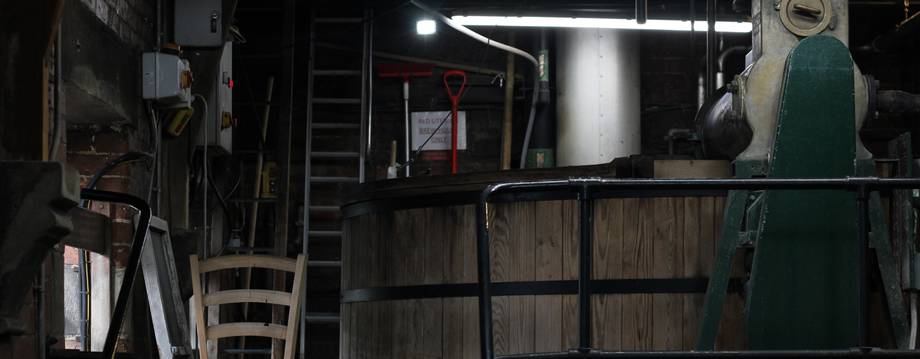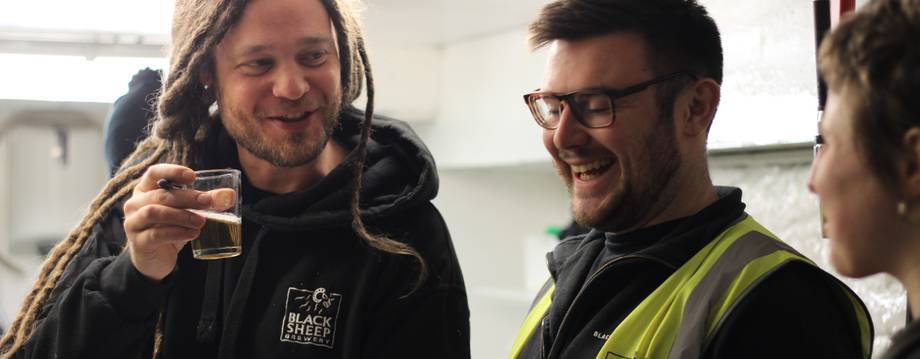Black Sheep
The craft pioneer bridging old and new
Robyn Gilmour
Saturday 11 March 2023

This article is from
Yorkshire
issue 89
Share this article
Jo Theakston is the only one among us who’s taller than 5’11”, making the low ceilings of the maltings-turned-brewery as much of a hindrance to him now that he’s a director here, as when he was the managing director Paul Theakston’s teenage son. When the brewery was founded, back in 1992, Jo’s job was to accept malt orders, and organise grain stores, among other tasks that make and break backs. Along with seeing millions of beers brewed, the walls of Black Sheep’s brewery have borne witness to families growing and changing, casks becoming keg, keg becoming can, and vacuum packed bags of citra beginning to arrive alongside dried bales of Goldings and Challenger. On a day that’s characteristically bleak for late January, the brewery watches on as Jo leads Rich and I through the belly of the building to a cellar where Black Sheep’s weekly team tasting is about to get underway.
The small stone room is rudimentary, with drainage shore, fluorescent overhead lights and a set of racked casks emulating the final resting place of Black Sheep’s beer: the well managed pub cellar. Jo already knows the beer will be pretty good, but this final frontier of testing will confirm that the secondary fermentation giving cask its subtle sparkle, is developing as it should. “We taste these beers every week” says Jo, gesturing to the five team members in high vis, already packed into the back of the small cellar and who welcome us as old friends. “They can kind of tell week on week the little nuances and fluctuations in flavour and condition. With cask, you’re working with a live product and organic ingredients so there's a natural ebb and flow. We might have one that’s slightly hoppier or slightly more fruity, though all within the spec.”

Jo Theakston
For all the team are well versed in this acceptable range of flavour and condition, Senior Brewer and taste test facilitator, Alex Brandon-Davies, is wonderfully welcoming and egalitarian in the approach he takes to us newcomers. Clipboard at the ready, he begins by saying “as new members of our tasting panel you need to know what we’re scoring here. We score for haze, out of four, condition, out of seven, and an overall subjective score, also out of seven– anything below a four is a fail, nothing ever gets a full seven, six is very good– and then we'll give it some descriptors as well, the wordier the better, we like to use our vocabularies”.
Mention of black pepper, burnt match, grass and grape is bandied around as we work our way through Best Bitter, Respire, Guzzler and Holy Grail until eventually we arrive at Riggwelter, a beer that is 27 years old on 31st of January 2023. For those not yet (but soon to be) familiar with what’s arguably the most iconic of Black Sheep’s beers, Riggwelter is a strong ale, ruby in colour with layers of roasted malts giving rise to notes of coffee, roasted licorice root, banana, and raisin. It is, put simply, sublime, and so moreish as to earn its name, an old norse farming term that referred to a sheep that had toppled (‘velte’) onto its back (‘rigg’), and been rendered incapacitated by the weight of its wet, wool fleece.
“When we first started, we just did a best bitter and a special ale, which was Black Sheep ale in the bottle” says Jo. “Off the back of the success of these two beers, we saw some increased demand, and had a couple of local beer festivals asking if we could supply them with a stronger beer, and we’d have to tell them, ‘well, we don’t actually do one of those’. So there were conversations around maybe needing a stronger beer to complete the range, and eventually, we made a brew that was first mashed on 31st January ‘96, and launched in cask on 19th February at The Maltings in York.”

Jo chuckled at this point, consulting a piece of paper that he reveals to be a log, written by Black Sheep’s original head brewer Paul Ambler, in May 1996, and which charted the development and reception of Riggwelter. Jo reads some of the final lines aloud for us. “Everything worked fine,” Paul writes, “except that our Yorkshire square yeast, which had never previously been offered such a banquet of fermentable sugars, yielded 6.4% alcohol by volume. Tasting results from both brewery staff and customers were enthusiastic.” No surprise there.
Over the better part of the last three decades, Black Sheep’s range has expanded beyond Best Bitter, Special Ale and Riggwelter, but now, I am interested to hear, it is in the process of contracting. This isn’t indicative of decline per se, but rather the precarious position in which pubs now find themselves. Jo says that cask consumption hasn’t recovered from the COVID years, and reckons it's still down 20-30% not because the style has declined in popularity, but because a combination of the cost of living crisis and rampant staffing shortages across the hospitality sector has meant pubs can’t afford to remain open seven days a week. This is, of course, bad news for cask, which needs to be consumed quickly once opened.

“In the modern world we live in, with all the cost pressures that we're seeing, we have to try and be efficient in the way that we produce beer”, says Jo. This efficency has been more than smart, or even agile, the brewery has been both brave and gracious in considering modern challenges as an opportunity to blend tradition with innovation, and grapple with modern problems using a tried and tested tool kit.
“When we came out of lock down, we needed to change the direction of the business a little bit and make it fit for the future”, says Jo. “So that was most of what I was doing last year, and is what gave rise to Respire”, a completely carbon neutral cask beer that involved reviewing the carbon footprint of everything from production methods, ingredients, and packaging, and extensively researching what high quality carbon credits could support offsets while helping environmental initiatives in Yorkshire. The final result saw Black Sheep partner with the Yorkshire Dales Millennium Trust. “We’ve also set ourselves some goals that are in line with North Yorkshire's Net Zero targets. The UK’s national net zero target is 2050, but North Yorkshire's is more ambitious. It's 2034. So we said, ‘okay, well, Yorkshire set that target. We need to align with what Yorkshire needs to do, because we're in it. So let's try and do our bit’”.
The Black Sheep team are currently working on bringing Respire to bottle format, and it should be available in supermarkets from late Spring. In the meantime, get yourself to any Black Sheep stockist, support your local, and petition your landlord to consider carbon neutral cask.
Share this article

